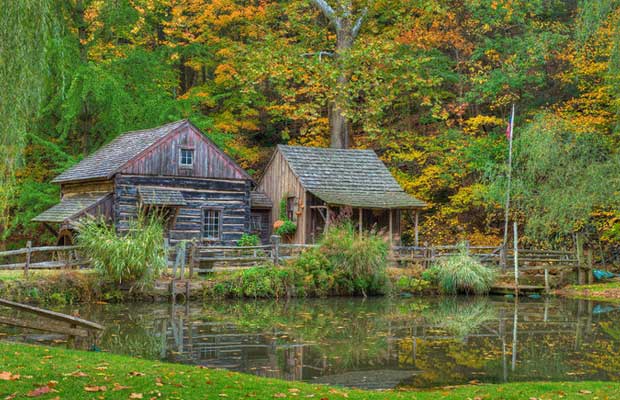What to Look for in a Survival Retreat
Prepping in some cases is about taking proactive steps to avoid or mitigate the risk of danger. Usually when we think of prepping nirvana the vision is a remote location, far away from the hustle and bustle of any city. Something like the Walton’s home that is far away from any neighbors and a trip into town isn’t something you make for a single carton of milk like we currently do. The ideal location provides safety from the threats we routinely discuss on Final Prepper, but there are a lot of factors to consider if you are looking for your own survival retreat.
Some of you may be thinking that the hour is at hand and any chance of finding a survival retreat for your family has passed. That train has left the station and if you aren’t already in your off-grid sustainable home, it’s too late. I don’t know if that is the case for everyone. I do believe that even if SHTF happened right now there would be ideal (as possible) locations that people could move to. Now, this movement might be a long and tortuous process. You may be moving not because you have stuck that For Sale sign in your yard, but you might be moving cross-country as part of a bug out after a collapse has happened.
Assuming for a minute that you have the resources, desire and time to move to a new survival retreat, your safe place from the rest of the world, what types of features should you be looking for to make your new home most suited for long-term survival and self-sufficiency? The items below are not in priority order, but I think they cover a few of the bases.
Water Sources
You know that you must have water. There is plenty of good property for sale in the desert that is pretty affordable, but without water how long can you live there? The perfect survival retreat property has at least two sources of water year round. A well is one desirable feature but if you are buying land outright with no improvements you may have to have someone come out and so an assessment on your property. Assuming you have a good source of ground water you could drill your own well or have someone take care of that for you. Rain barrels are a great alternative, but what if it doesn’t rain enough to replenish the supplies you need?
In addition to a well, running water in the form of a spring, river, stream or even stationary water from a pond will greatly extend your ability to provide water for your family, livestock and crops. It should go without saying that all water on the surface will need to be disinfected prior to drinking. Well water will need to be tested also to make sure it doesn’t contain toxins from farm runoff or pesticides aren’t present. The USGS has a good page explaining different sources of water for the rural homeowner and important considerations.

Soil Quality
So you have a great piece of land nestled back in the forest and water flows freely from a creek on the property. You still have to eat don’t you? For most people that includes some form of crop production that will likely account for most of the food you consume. You can have thousands of chickens but you will need to grow crops to feed them as well as yourself. Man cannot live on chicken nuggets alone contrary to what millions of children across the world think.
Testing the soil quality on a piece of land is an important consideration before you purchase any property. There are soil testing kits you can purchase online that will quickly tell you the soil conditions. Once you know the type of soil you have, you can work to amend it if necessary. There are a few common issues:
- Soil is too acidic – Adding lime, poultry manure or wood ash to your soil can make it more alkaline and raise the pH to a healthier level.
- Soil is too alkaline – Many gardeners swear by coffee grounds as an inexpensive, safe and readily available way to lower pH levels.
- Soil is lacking nutrients – Organic matter can include anything from compost to bone meal to lawn clippings, depending on your specific needs.
- Soil is too sandy or dense – Adding peat moss is an inexpensive and effective way to loosen up clay soil, while compost can build up and enrich sandy soil.
If you don’t have the ability to purchase a soil testing kit, you can go the DIY route as well. The video below shows you how.
Growing Season
Along with soil quality, you will need a long growing season to maximize the amount of produce and crops you can grow. Each part of the world is different and most sustain some form of plant growing, but there are differences. You can read more about growing zones on the USDA website or view the map below to see where your survival retreat property falls.

Location

This is usually the first criteria that people consider when they are looking for a new home and you might say some of the items above fall into the location aspect. The location of your retreat does matter greatly from a couple of standpoints. Ideally you want to be further away from high concentrations of people. The golden horde affect will be a very real risk I believe in the face of large disasters, wars or economic issues. Look at the migrants fleeing Syria right now landing in Hungary to see a real-live example of the migration of people away from troubled areas. The further away you are from large centers of people the better off you will be from the risk of a swell of people on foot in a tragedy.
Do you have plenty of timber on your property? How far away are you from neighbors? Will there be any developments that put a big neighborhood or shopping complex in your back yard? Who owns the property near you?
Location also matters when you are considering paying for this new survival homestead. Are you able to find work that will pay the bills? Even if you buy your piece of land and pay cash for it, there will always be taxes. You will likely need to purchase some supplies and that requires money. Perhaps you have a source of income that isn’t dependent upon location and that might be the best. What about schools, access to healthcare? All of these are considerations you will need to make. Strategic Relocation is a great resource that takes a lot of the finer points and makes them easy to search. We also have access to a free download that allows you to use Google Maps to mine data on threats as well. Read more about that here.
Moving is never easy, but if you are planning to move primarily for the security of a survival retreat, the decisions are harder than simply moving to a better neighborhood across town.
What other factors would you consider before you moved?
Prepping in some cases is about taking proactive steps to avoid or mitigate the risk of danger. Usually when we think of prepping nirvana the vision is a remote location,



